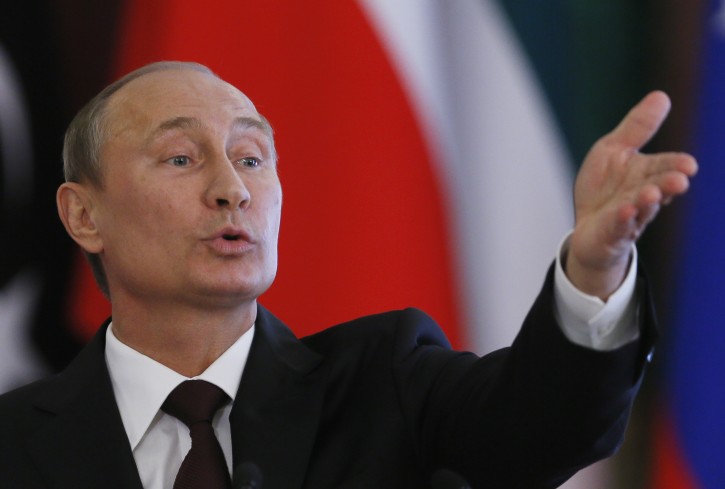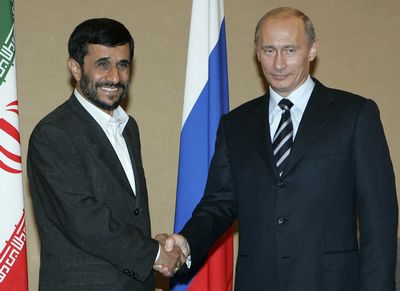
The Gas Exporting Countries Forum, or GECF, is an organization normally kept away from radar screen. The matter is that its creation in 2001 was initiated by Iran and, as a rule, Iran’s foreign policy initiatives are routinely hushed up by world media.
But that is not the real reason. The US political elite made their attitude clear in the letter the House of Representatives sent to then State Secretary Condoleezza Rice (April 2007). The document put it in an absolutely candid way saying that the chances were high the Forum could transform into a kind of gas OPEC. Its creation was viewed as an attempt to establish «a global extortion racket organization».
Since then some kind of silent ban on highlighting the Forum’s activities has been in force. But it is mainly related to media, because for the West the gas market has transformed into an arena of tough fight against Russia. It targets its most sensitive underbelly – the energy sector.

They do their best to use the Forum agenda for this purpose and Qatar is used as a centerfield. Some kind of political outsourcing has become a routine thing for the global game played by Washington during the Barack Obama’s tenure. The responsibility for tackling ‘hot Issues» like Syria and the use of Manas air base in Kyrgyzstan is shifted to allies. The United States prefers to make others pull the chestnuts out of the fire to make it a winner taking it all.
Talking about the Forum, the existing contradictions have been adroitly used and, as a result, a «gas cartel» has failed to materialize. The attempts of some members (Iran, Russia, Venezuela and Algeria) to create a mechanism enabling the organization to exert significant influence on natural gas world prices have remained a wishful thinking.
Moreover, when one reads thoroughly the addresses of Russia’s President Vladimir Putin and other participants, it becomes clear that the three core ideas agreed on at the October 2008 Tehran meeting are still unaccomplished. Back then Russia, Iran and Qatar concluded a three – party gas cooperation agreement, which envisioned:
– quarterly consultations devoted to the state of gas markets;
– setting up a technical committee to address joint projects, which encompass the whole production chain, including geological exploration, extraction, transportation and marketing;
– establishing the international journalists and experts privileged club called «Energy Pole», a kind of information instrument to promote the GECF and «big troika» (Russia, Qatar, Iran) interests in the world.
In a little bit different words the issues were discussed in Moscow on July 1. The fact corroborates the fact that during the five years passed the Gas Exporting Countries Forum has failed to make use of its potential.
Actually it’s just another discussions club today, which serves as a platform for «exchange of experience, views and information on gas industry». This is only one aspect of the issue. There is more to it. The Forum is a sort of storage for unaccomplished plans. It is also an indicator of «gas war», an instrument to gauge the options for forming potential geopolitical alliances.

Russia diplomats often say there are no «fundamental contradictions» between Russia and the West. The gas market situation, the Qatar’s gas market expansion, partly a bluff, partly a string of real steps, it all goes to show the contradictions do exist and their anti-Russian dimension is growing exponentially.
Actually, the idea of waging «energy war» against Russia is far from being something new. In the 1970s the United States of America did its best to bury the Blue Stream Urengoy–Pomary–Uzhgorod pipeline project. In the 1980s the Cold War was in full swing. The United States along with Saudi Arabia and other Persian Gulf monarchies played games to bring down world oil prices. Today the weapon to use is shale gas and Qatar…
In fact, the Moscow Gas Exporting Countries Forum conference showed the Emirate is an antagonist toward the Russia’s proposals to create a really working mechanism of price control and switching to rather long-term, than short-term, contracts.
Qatar or, to be more precise, the Western management of the Qatari companies, does nothing more than making statements about gas prices that should be high, but «acceptable for consumers» and the competition of producers which should be free and unrestrained.
Doha thinks any kind of cartel is impossible because the United States of America, Canada, the European Union and Australia would not like it. They would launch accusations of trust conspiracy and demand the issue be transferred to international arbitration.
It should be noted, the mechanism of counteraction is already launched against Russia.
By the end of June German RWE won the lawsuit against Gasprom making it change the gas supplies contract. Actually, it serves as a legal precedent for other European companies dealing with the Russian gas giant. In parallel, the European Union has launched an investigation of Gasprom activities.

Against this background over a quarter of European Union consumed liquefied gas comes from Qatar. The Qatar National Bank analysts warn the supplies will go down by 2014, but some experts say that, quite to the contrary, Qatar will increase its European supplies by 50 billion cubic meters annually, which means it will expand the share of European market by 5%.
The increase will take place due to the following reasons. Unlike Russia, Qatar will not have to create additional liquefied gas production capability. It has already boosted the production potential for US exports. Formally it is said that because the United States had its own gas production boom all the agreements with the Emirate were annulled pushing it to enter the European market.
That’s why Qatar is interested in increasing liquefied gas exports; it can do it easily resorting to short-term sales and dumping prices, something going contrary to Russia’s interests.
It also adopted a behind the curtain policy at the Forum trying to convince Russia it’s attitude is friendly, the Emirate is ready to cooperate. Qatar-Russia bilateral relations reached the peak in 2010.
In March Prime Minister of the country visited Moscow; he promised ample investments and welcomed the Dmitry Medvedev’s proposals aimed at promoting the consortium of gas producers.
In April Russian then Vice-Premier Igor Sechin and then Energy Minister Sergei Shmatko went to Qatar to talk on bilateral interaction and establishment of state committee on gas cooperation. The same year Qatar invited Gasprom to take part in the North Dome (adjacent to the South Pars) natural gas condensate field development in the Persian Gulf which is under moratorium till 2014.
At the same time Qatar promised to invest into the South Tambei gas and gas condensate field in the Yamal peninsula and the construction of Yamal-SPG project (SPG is the Russian acronym for LNG). No need to say the Qatar’s promises have remained unfulfilled. In 2010-2011 Russia offered Qatar to take part in a plethora of oil, gas, gold, construction and other projects with the overall estimated cost of 10-12 billion dollars. Qatar never took part in any of them while increasing investments into elite real estate and European soccer teams.
Moreover, a Gasprom office opened in Doha in February 2013. But as soon as April 1, the Qatari Prime Minister said at a Doha energy forum that the Emirate was intent to compete with Russia for gas contracts in South Europe. It plays a «double game» with Russia promoting the United States and the European Union desire to diminish the dependence of South Europe and Turkey on Russian energy supplies.
Especially since Qatar has two aces to play in the «gas war» game. First, the liquefied gas sea supplies are cheaper than the gas transported by pipelines, second, the European Union’s «third package» is primarily targeted against the supplies coming from Russia. The EU is adamant pushing it through. It can do it being backed up by the Emirate and its gas export capability.

The Qatar’s double game gives rise to one more intrigue, the fact once again proven at the Moscow Gas Exporting Countries Forum conference. Once no arrangement with Qatar is possible, it is worth to think about «special relationship» with the countries which view the Moscow initiatives favorably because they meet the interests of their national economies, the states like Venezuela, Iran and Iraq. The accords with the Islamic Republic may be an important factor promoting Russia’s general advance on all fronts of the «gas war».
Unlike Qatar, Iran puts forward hard-nosed joint projects proposals, including the development of South Pars… The breakdown of possible accords serves the vital interests of Washington. It managed to do it once. In October 1997 Russian Gasprom, French Total and Malaysian Patronas signed an agreement with Tehran on developing the field. Washington displayed ingenuity to effectively spoil the things. It blocked the Gasprom initial loan which was to be granted by the Export-Import Bank of the United States.
In July 2010 then Russian Energy Minister Sergei Shmatko and his then Iranian counterpart Masoud Mir-Kazemi signed a road map on oil and gas cooperation. Russia said the agreement in practice opened the way for unlimited cooperation. It was a twenty years program on extraction, processing and introduction of innovative technology. Iran suggested the parties create a joint bank and use national currencies to fund joint energy projects.
China’s participation was also envisaged. International and unilateral sanctions had already been imposed against Iran. Moscow assured Tehran the sanctions would not hamper the bilateral energy cooperation
It was all stopped because the United States used financial instruments at its disposal to put pressure: it introduced unilateral sanctions against Iranian banks intimidating everyone else who defies them. Russian banks were quick enough to terminate all interaction with Iran. It went even further. US and European banks demanded that Russian banks report any transactions with Iran. What’s interesting, they do get the required information.

The matter is that there is no way Russia could stop the Qatar’s gas expansion without cooperating with Iran. More than that, the traditional «looking back at the West» that our diplomacy is prone to, may entail serious economic damage.
No doubt, unfreezing the agreements already concluded is a tall order, that’s why the key issue defining the Putin-Ahmadinejad agenda was…Syria.
Does it have any relation to gas wars? Exactly, it is directly related to the issue! It’s not a big thing for Iran to significantly curtail the liquid gas exports from Qatar, which go through the Hormuz Strait.
It’s well understood, so Qatar, which enjoys the support of the West, strives to get rid of the dependence. The way to do it is to create a «transit corridor» across the territory of Syria building a pipeline to the Mediterranean and Europe. Moscow and Tehran friendly Bashar Assad is a hindrance, the plans are unachievable till he stays in power.
Until 2011 Qatar had invested around eight billion dollars into the Syrian economy, in particular into tourism and real estate. It had not got the main thing – the Assad’s loyal support of its gas expansion. That’s why the Syrian corridor is «hacked through» by the use of force, while international jihadists get the investments.
In the given context, the joint efforts applied by Russia and Iran are not guided by geopolitical reasons only. Their cooperation is of great economic importance, it’s the way to prevent the Qatar’s gas expansion aimed at squeezing Russia out of traditional gas markets, or, at least, curtailing its presence there.
